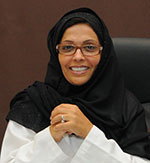Maha Almuneef: Alumni Profile
By Glenny Brock |
|
Maha Almuneef addresses domestic violence issues through education, public policy, and patient care. |
Maha Almuneef, M.D., speaks in a pretty, thrumming cadence, particularly when she reminisces about the years she spent at UAB, completing her residency training in pediatrics at Children’s Hospital.
“I loved the Southern hospitality,” Almuneef says by phone from her home in Riyadh, Saudi Arabia. “In the residency, there were people from all over the world, from every imaginable background, that shaped who I am today. It was like my second home.”
A Saudi native, Almuneef was in Birmingham from 1991 to 1994. She had been accepted into a residency program at Harvard University but opted for UAB instead. “My husband had just been accepted into a Ph.D. program at Auburn University,” she recalls. “Plus I had a young son at the time, so it was best for my family to be closer together. Besides, I had been told that the residency program [at UAB] was one of the best in the country.”
Later, when Almuneef went to Yale to complete her postdoctoral fellowship in infectious disease, her Ivy League classmates teased her about Alabama. “But if it happened again, I would still go to UAB, because my experience at Children’s Hospital was so extraordinary.”
In fact, one incident during her residency altered the course of Almuneef’s personal and professional life. “I was on call in the ER, and a Saudi man came in with his eight-month-old son,” she says. “Bruises and head injuries made it obvious this was an abused child. I got involved as more than a physician: I was translating. I was talking to law enforcement. In the wife I saw a young woman far away from home, with her child and herself being abused. We worked to get the perpetrator punished.
“I never forgot that experience,” Almuneef says. “I thought of that woman so often. When I came back to Saudi Arabia, I realized there were hundreds of thousands of children who needed an advocate. So I began working at the community level with street children and raising awareness on child rights. There are so many abused children in need. Now I’d say infectious disease work, which is my subspecialty, is a little bit of what I do—about 30 percent—and I spend 70 percent of my time on general pediatrics and child protection.”
Starting from Zero
“In the United States, there is a system” for responding to child abuse, Almuneef says. “When I returned to Saudi Arabia and began to tackle problems in a place with no system, I had to start from zero. I had to figure it out myself.”
Almuneef now serves as the executive director of Saudi Arabia’s National Family Safety Program (NFSP). Since its launch in 2005, the NFSP has had a mission to build awareness and to create a safe community that protects and defends individuals’ rights and helps the victims of domestic violence. “We felt that Saudi Arabia—with its economic, human, and material resources—was prepared to begin dealing with these problems,” Almuneef says.
In addition to creating awareness campaigns, training courses for professionals working with and for children, and special parenting programs, the NFSP has drafted legislation ultimately passed by the king’s decree. “I often hear the criticism that it is a shame to talk about this,” Almuneef says, “but I believe it is a shame not to talk about this. It is a shame if we close our eyes to it.”
Last year, Almuneef was elected president of the Arab Professional Network for Prevention of Violence Against Children, which creates multidisciplinary child-protection teams in hospitals throughout Saudi Arabia. Modeled after similar teams in U.S. hospitals, the Saudi groups consist of physicians, psychologists, psychiatrists, and, when necessary, law enforcement officials. “We train them and give them the skills to manage cases, particularly on how to report each case to the national registry,” Almuneef says.
That national registry is new for Saudi Arabia. Gathering data on every case of child abuse in the kingdom helps Almuneef and other advocates to map the work ahead of them. “Whereas before we did not know how much abuse there was in Saudi Arabia, the national registry begins to give us a sense of prevalence—the number of incidents and the risk factors,” she says. “Knowing what is happening tells us the major problems we must deal with, from poverty to family dysfunction to other factors. The more we know, the more we can focus on the problems that need our most urgent attention.”
A Voice for Children
Almuneef describes her work as incredibly challenging but deeply rewarding, particularly during and after the Arab Spring, when there has been so much suffering among the children of Middle Eastern countries. “For me, I am willing to be the voice of these miserable abused children,” she says.